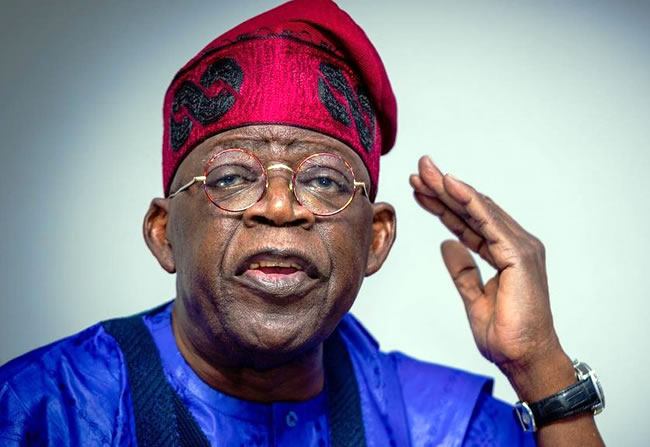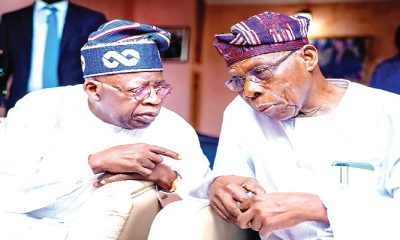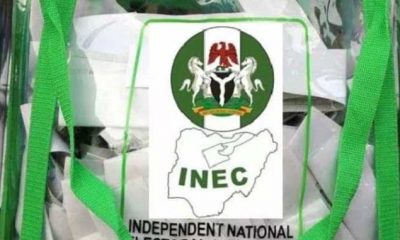Politics
EXPLAINER: Why PEPC Consolidated Petitions Against Tinubu

On Tuesday, May 23, 2023, Presidential Election Petition Court (PEPC) in Abuja ordered the merger of the cases filed by Atiku Abubakar, Peter Obi and the Allied Peoples Movement (APM) to challenge Bola Tinubu’s victory as Nigeria’s president-elect.
In a ruling detailing a report of its pre-hearing session on Mr Obi’s petition, the court ordered a consolidation of the three pending petitions (Obi, Atiku and APM).
The panel’s chair, Mr Tsammani, citing Paragraph 50 of the First Schedule of the Electoral Act 2022, said the interest of justice would be served by a merger of the petitions.
“The justice of these petitions demands that this petition be consolidated,” Mr Tsammani said.
Legal perspective
Consolidation in this stance means to combine (two or more lawsuits or matters that involve a common question of law or fact) into one compare class action
NOTE: Consolidation of matters in the federal court is governed by Rule 42 of the Federal Rules of Civil Procedure.
Consolidated cases may become one single action with a single judgment, or may retain their individual identities although tried together. The court may also try one representative case and render a judgment binding on the other cases (which is based on the discretion of the court to decide). Hence, it is constitutional and not a policy decision as in the case of the live broadcast of proceedings put forward by Atiku and Obi’s legal team.
What this implies
With the consolidation of the three pending petitions, the court is bound to conclude proceedings and give judgment on all pending suits by 16 September as against waiting till the expiration of the 180 days for hearing. Hence, the petitioners must assemble all their witnesses to testify before the court before the aforementioned date.
Obi’s prayers
1. (i) That it be determined that at the time of the Presidential Election held on 25th February 2023, the 2nd and 3rd Respondents (Tinubu and Shettima) were not qualified to contest the election.
(ii) That it be determined that all the votes recorded for the 2nd respondent in the election are wasted votes, owing to the non-qualification/disqualification of the 2nd and 3rd respondents.
(iii) That it be determined that on the basis of the remaining votes (after discountenancing the votes credited to the 2nd Respondent), the 1st petitioner (Mr. Obi) scored a majority of the lawful votes cast at the election and had not less than 25 per cent of the votes cast in each of at least 2/3 (two-third) of the states of the federation, and the Federal Capital Territory, Abuja, and satisfied the constitutional requirements to be declared the winner of the 25 February 2023 presidential election.
2. That it be determined that the 2nd Respondent having failed to score one-quarter of the votes cast at the presidential election in the Federal Capital Territory, Abuja, was not entitled to be declared and returned as the winner of the presidential election held on 25 February 2023.
IN THE ALTERNATIVE TO 2 ABOVE:
3. An order cancelling the election and compelling the 1st Respondent to conduct a fresh election at which the 2nd, 3rd and 4th Respondents shall not participate.
IN THE ALTERNATIVE TO 1, 2 AND 3 ABOVE:
4. (i) That it may be determined that the 2nd Respondent was not duly elected by a majority of the lawful votes cast in the election for the office of the President of the Federal Republic of Nigeria held on 25 February 2023; and therefore, the declaration and return of the 2nd Respondent as the winner of the Presidential election are unlawful, unconstitutional and of no effect whatsoever.
(ii) That it be determined that based on the valid votes cast at the Presidential election of 25 February 2023, the 1st Petitioner scored the highest number of votes cast at the election and not less than one-quarter of the votes cast at the election in each of at least two-thirds of all the States in the Federation and the Federal Capital Territory, Abuja and ought to be declared and returned as the winner of the Presidential election.
(iii) An Order directing the 1st Respondent to issue the Certificate of Return to the 1st Petitioner as the duly elected President of the Federal Republic of Nigeria.
(iv) That it be determined that the Certificate of Return wrongly issued to the 2nd Respondent by the 1st Respondent is null and void and be set aside.
FURTHER ALTERNATIVES TO 1, 2, 3 AND 4 ABOVE
5 (i) That the Presidential election conducted on 25th February 2023 is void on the ground that the election was not conducted substantially in accordance with the provisions of the Electoral Act 2022 and Constitution of the Federal Republic of Nigeria 1999, as amended,
(ii) An order cancelling the’ Presidential Election conducted on 25th February 2023 and mandating the 1st Respondent to conduct a fresh election for the office of President, the Federal Republic of Nigeria.
Atiku’s prayers
In seeking to upturn Mr Tinubu’s victory, Atiku set out seven prayers.
He urged the court to determine that Mr Tinubu was “not duly elected by a majority of lawful votes cast, and therefore the president-elect’s victory “is unlawful, wrongful, unconstitutional…null and void.”
Atiku prayed the court to determine that Mr Tinubu at the time of the election was not qualified to contest the said election.
“That it may be determined that the return of the 2nd Respondent (Mr Tinubu) by the 1st respondent (INEC) was wrongful, unlawful, undue, null and void having not satisfied the requirements of the Electoral Act and constitution…” which mandatorily requires Mr Tinubu “to score bot less than one quarter (25%) of the lawful votes cast at the election in each of at least two-thirds of all the states in the federal and the Federal Capital Territory, Abuja.”
He urged the court to declare him the winner of the presidential election, as he “scored the majority of lawful votes cast at the presidential election.
In the alternative, Atiku asked the court to make an “order directing” INEC “to conduct a second election (run-off) between” him and Mr Tinubu.
“That the election to the office of the President of Nigeria held on 25 February, 2023, be nullified and a fresh election be ordered,” the petitioners prayed.
APM’s prayers
On its part, the APM filed a petition against the outcome of the 25 February presidential election on 20 March, asking the tribunal to declare Atiku as the president-elect.
In its petition, the APM whose presidential candidate, Chichi Ojei, polled 25,961 votes, argued that Tinubu was not properly sponsored by the APC by fielding Shettima as vice presidential candidate for the election.
Tinubu, while submitting his presidential nomination form to INEC in June 2022, chose Ibrahim Masari, a politician from President Muhammadu Buhari’s home state Katsina, as a “placeholder” for the substantive vice presidential candidate who would later be Mr Shettima.
Masari served as a placeholder and later announced his withdrawal from the position, which paved the way for Tinubu to name Mr Shettima as his running mate on 10 July 2022.
The APM referenced this as one of its major grounds for complaint over the outcome of the presidential election.
(Tribune)
Send Us A Press Statement Advertise With Us Contact Us
And For More Nigerian News Visit GWG.NG














